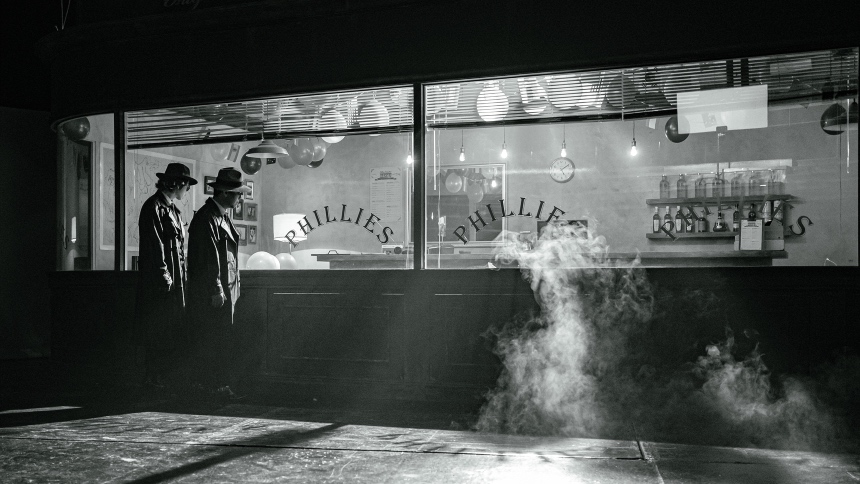Busan 2024 Review: THE KILLERS, Lee Myung-se Masterminds Gleefully Cinematic Hemingway and Noir-Inspired Anthology

Some 17 years ago, viewers were both maddened and mesmerized by the tactile fever dream that was M, a cornucopia of sound and motion that is, for the moment, Lee Myung-se's last feature-length testament to the cinema medium he so adores.
Though it doesn't quite qualify as a full feature return, Lee is back on stage presenting the richly cinematic four-part anthology film The Killers. Lee spearheaded this project as a creative producer and directed its final segment. Also in the formidable directing roster are Kim Jong-kwan (The Table), Roh Deok (Very Ordinary Couple) and Chang Hang-joon (Forgotten).
The film essentially features four adaptions of Ernest Hemingway's famous 1927 short story of the same name, in which two hitmen enter a small town diner one evening and terrorize the staff and a fellow patron while waiting for a target who never arrives.
Each chapter also visually references Edward Hopper's painting 'Nighthawks', a landmark of American art inspired by Hemingway's story. They also draw upon, to varying degrees, the various film adaptions of the story, including Robert Siodmark's classic 1946 noir with Burt Lancaster and Ava Gardner, Andrei Tarkovsky's 1956 debut student short film, and Don Siegel's 1964 color adaptation featuring Lee Marvin, John Cassavetes and Angie Dickinson. All of the films also feature Sunny and Miss Granny actress Shim Eun-kyung, who is in sensational form as she boldly sashays through the very different roles.
Opening the film in stark monochrome is Kim Jong-kwan's elegant vampire tale 'Metamorphosis', the arthouse director's first foray into genre cinema. After failing to pay his debts, a man is beaten by loan sharks but manages to escape before meeting his ultimate fate. With a blade sticking out of his back he stalks the night streets and somehow winds up in a cocktail bar. The film switches to color, and red floods our eyeballs from the decor and lighting to the blood that will soon liberally flow.
With brash music, camerawork and performances straight out of 40s Hollywood, Kim evokes the mood and feel of the noir, though this first course has the least narrative connection to Hemingway.
Next up is the side-splitting and devilishly clever 'Contractors' by Roh Deok, who is having a spectacular year after also showrunning the year's best K-drama, the fantasy romantic comedy Way Back Love with Kim Min-ha and Gong Myung, which premiered in Busan and will hit the small screen early next year.
A stunning woman in oversized sunglasses -- a cameo by Roh's Glitch star Nana -- visits a man with a big bag of money, asking him to kill a vile professor. The job then gets passed down to lower and lower-grade contractors, with each of them massively skimming off the top and the identifying information of the target completed garbled in a morbidly amusing sequence of Chinese whispers, until a trio of hapless youths undertake the job for a couple of hundreds bucks and of course nab the wrong person.
Aside from being very, very funny, 'Contractors' is also an unusually astute piece of filmmaking for a comedy, with Roh showing a range of very clever visual tricks to tell her cynical story. Among these tricks is a wonderful shot reverse sequence in the opening scene employing a mirrored table and a camera constantly scanning up and down between the subjects and their reflections.
Chang Hang-joon follows with 'Everyone Is Waiting for the Man', which swaps out Hemingway's dinner for a hole-in-the-wall restaurant in a small coastal town and features far more than a pair of hitmen 'waiting for the man'.
There's the detective in the restaurant but also his feckless partner outside, a pair of very odd men that could either be stand-ins for the Hemingway hitmen or the espresso-swilling shadow figures in Mulholland Drive, a young police officer on patrol and the mysterious women running the establishment.
Stylish and tense, Chang crafts a compelling chamber piece that manages to be both gruesome and amusing while the story keeps us guessing until the end.
That leaves us with Lee's closing chapter 'Silent Cinema' -- spoiler, there's nothing silent about it. Lee has always stood out from his cinematic peers, bringing style and furious experimentation to Korean cinema, starting with his madcap debut Gagman, a decade before anyone had heard of the likes of Park Chan-wook or Bong Joon-ho, and all the way through to his masterpieces Nowhere to Hide and Duelist.
In Lee's cinema, narrative is a secondary concern. He is far more concerned with compressed sound and image in shapes and feelings that are unfamiliar but, if you let yourself go along with his idiosyncratic vision, utterly electrifying.
All the segments of The Killers play with the medium of cinema, but 'Silent Cinema' unsurprisingly goes a step further, while also being the segment that mostly closely hews to the source material and all the cinematic adaptations it inspired.
From its stark black and white photography down to the design of the words 'The Killers' early in the segment, Lee's chapter most closely resembles Robert Siodmark's landmark first adaptation, which adapts Hemingway's story almost word for word in the first ten minutes of that film. But there are also flashes of Don Siegel's version here, echoed by the sunglasses worn by the killers, and Tarkovsky's debut short film, which Lee visually references through some of his framing.
Lee uses every trick in the book to create a feast for the senses. His delirious footage confounds us and captivates us as it jumps backwards and forwards, speeds up, slows down and freezes, constantly challenging all the rules the medium is so often bound by.
Not everything in The Killers works, certainly at a narrative level, but the joy of cinematic rediscovery and experimentation that each of these filmmakers engages in makes this a thoroughly worthy anthology and one that benefits from being on the big screen, particularly for Lee's segment.







